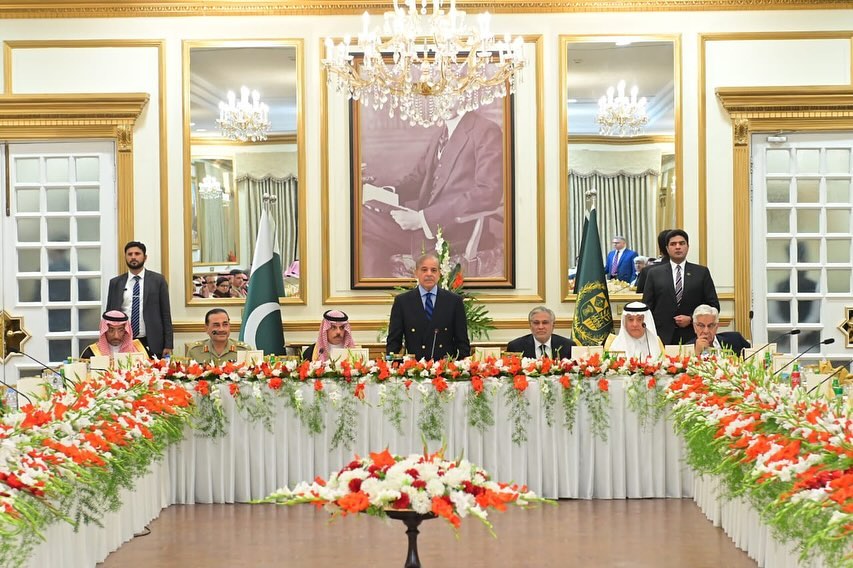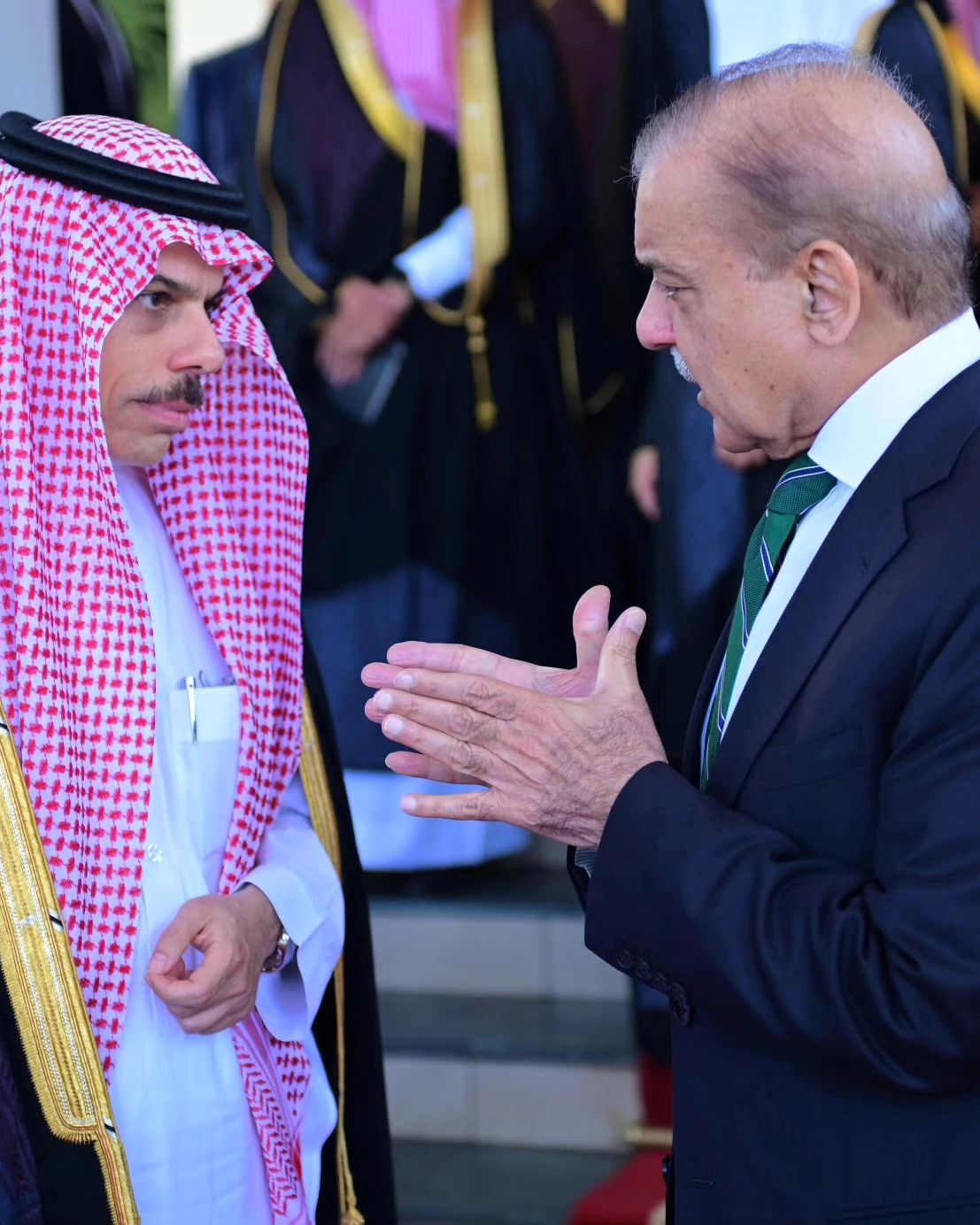Pakistan and Saudi Arabia enjoy a long-standing friendship based on a shared religious identity, trade ties, and security cooperation. After assuming office, Prime Minister Shehbaz Sharif went on his first foreign visit to Saudi Arabia. This came shortly after the Saudi Defence Minister had visited Pakistan to witness the Pakistan Day Parade on 23 March.
The recent flurry of diplomatic activity between Pakistan and Saudi Arabia has sparked optimism for both nations, particularly in light of Pakistan’s pressing economic challenges. A series of high-level meetings underscores a renewed commitment to strengthen bilateral ties and boost economic cooperation.
This renewed emphasis comes after a high-level visit by Saudi Arabia’s Foreign Minister Prince Faisal bin Farhan Al-Saud to Islamabad in mid-April. The visit follows a meeting earlier in April between Pakistan’s Prime Minister Shehbaz Sharif and Saudi Crown Prince Mohammed bin Salman.
The joint statement, released following their meeting at Al-Safa Palace in Makkah Al-Mukarramah on April 7, emphasised the historical fraternal relations between the two countries and outlined plans for enhanced collaboration across various sectors. Both leaders discussed expediting a $5 billion Saudi investment package for Pakistan.

Saudi Arabia has long been a key source of financial assistance and oil imports for Pakistan. The Sharif family, currently leading Pakistan’s government, has historically had strong ties with the Saudi royal family.
Editorials in Pakistani newspapers highlighted the “productive” visit by Prince Faisal, where discussions centred on Saudi investments in various sectors like agriculture, energy, and minerals. Pakistan’s Information Ministry expressed hope that the Saudi investment would “increase export capacity” and create “joint ventures.” News reports also suggest Saudi Arabia might invest in the multi-billion dollar Reko Diq gold and copper mining project in Balochistan.
The significance of Saudi investment in Pakistan cannot be overstated, especially against the backdrop of Pakistan’s recent economic woes. The country has been grappling with inflation, a widening fiscal deficit, and external debt challenges, exacerbated by the global economic downturn. The infusion of capital from Saudi Arabia holds the potential to stimulate economic growth, create job opportunities, and alleviate poverty.
Saudi Arabia has long been a key source of financial assistance and oil imports for Pakistan. The Sharif family, currently leading Pakistan’s government, has historically had strong ties with the Saudi royal family.
However, the relationship has seen some strain in recent years. Pakistan’s parliament’s decision to stay neutral in the Yemen conflict and former Prime Minister Imran Khan’s efforts to organise an Islamic summit outside the umbrella of the Saudi-backed Organisation of the Islamic Cooperation (OIC) caused friction.
Despite past disagreements, both countries seem eager to move forward.
During the visit to Islamabad, the Saudi delegation led by Foreign Minister Prince Faisal bin Farhan Al-Saud visited the Special Investment Facilitation Council (SIFC) and received a detailed briefing on potential investment opportunities in key sectors of Pakistan’s economy. The SIFC platform aims to streamline investment processes and ensure rapid decision-making. According to Pakistan’s Foreign Office, “both sides held exhaustive deliberative sessions at a functional level to crystallise investment opportunities in Pakistan.”
While the Saudi investment package offers a much-needed financial boost, Pakistan’s government needs to ensure political continuity and transparency in economic policies to attract and retain foreign investment.
The Saudi visit was overshadowed by escalating tensions in the Middle East, with Israel and Iran launching an attack and counterattack on each other in the backdrop of the ongoing Israeli genocide in Gaza, systematically making the strip uninhabitable. In a press conference with Pakistan’s Foreign Minister Ishaq Dar, Saudi Arabia’s Foreign Minister Prince Faisal bin Farhan Al-Saud called for an immediate ceasefire. “The situation is unacceptable. This is a complete failure of the international system. We must have a ceasefire now,” Al-Saud said, adding, “The reality is the international community is not living up to its responsibility. We must do more to end the killing.”
During the visit to Islamabad, the Saudi delegation led by Foreign Minister Prince Faisal bin Farhan Al-Saud visited the Special Investment Facilitation Council (SIFC) and received a detailed briefing on potential investment opportunities in key sectors of Pakistan’s economy.
Pakistan agrees with the Saudi position on Gaza and issued a press release urging “all parties to exercise utmost restraint and move towards de-escalation” in the Middle East, in reference to the escalation of hostilities between Israel and Iran.
 The evolving dynamics of Pakistan’s relations with regional actors, particularly Saudi Arabia and Iran, present both opportunities and challenges. While Pakistan seeks to deepen economic ties with Riyadh, it must also navigate its relations with Tehran delicately.
The evolving dynamics of Pakistan’s relations with regional actors, particularly Saudi Arabia and Iran, present both opportunities and challenges. While Pakistan seeks to deepen economic ties with Riyadh, it must also navigate its relations with Tehran delicately.
Pakistan walks a diplomatic tightrope, as it is scheduled to host Iran’s president later in April and is keen to maintain good relations with its neighbour despite US disapproval of the Iran-Pakistan gas pipeline project.
Pakistan faces a serious energy shortage, and Iranian gas could be a reliable and affordable source. However, the US has imposed sanctions on Iran and disapproves of the pipeline project, fearing it could benefit Iran’s economy. The situation has become even more complex following Iran’s retaliatory strike on Israel.
In the current scenario, Pakistan can navigate its relationship with the US, Iran, and Saudi Arabia by emphasising its need for energy security and maintaining neutrality in regional conflicts. Open communication with all allies about Pakistan’s energy situation and its chosen course of action can be helpful.
The recent developments signal a renewed commitment between Pakistan and Saudi Arabia. While the personal ties between the Sharif family and the Saudi leadership might play a role, strong economic ties are key to a sustainable and mutually beneficial partnership. The success of these endeavours will depend on Pakistan’s ability to create a stable investment environment and navigate its complex regional relationships.








